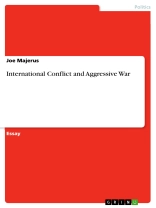Essay from the year 2017 in the subject Politics – General and Theories of International Politics, grade: 1, 7, , language: English, abstract: The concept of universal peace cannot exist without the notion of international conflict. As with any other diametrically opposed reference systems—unipolar/multipolar, status-quo/revisionist, identity/alterity, etc.—it is arguably less the phenomeno-hermeneutical study of these two conditions as individual occurrences than the nexus and antithetical relationship which exists between them which ultimately provides the most interesting avenues for scholarly research into their various subcategories. Since the ideal of universal peace is central to this dissertation’s underlying historical analysis, a thorough engagement with its natural opposite therefore deserves particular attention.
Two important qualifications, however, are in order: first, international war and conflict as here applied shall refer exclusively to wilful and aggressively pursued manifestations thereof, and thus not to the use of defensive war measures. While the latter designates the legitimate recourse to military force for the purpose of repelling an attack against the territorial integrity, political independence or interests of a political entity, its aggressive equivalent, on the other hand, represents the deliberate attempt of one unit to diminish or outright destroy the aforementioned, highly prized attributes of another. Secondly, it is important to remember that although a universal peace specifically implies the system-wide preponderance of both negative and positive peace elements, its possible termination, meanwhile, does not necessarily require the occurrence of universal war on a global scale—at least not initially. For even though the sudden outbreak of total systemic warfare would undoubtedly shatter world peace all by itself, its fragile composition might already become endangered by developments involving far less devastating and cataclysmic convulsions. History after all is rife with examples where the actual sources of transnational conflict are not just to be found in the eventual military clash of antagonists following a blatant breach of the peace by one of them.
Joe Majerus
International Conflict and Aggressive War [PDF ebook]
International Conflict and Aggressive War [PDF ebook]
قم بشراء هذا الكتاب الإلكتروني واحصل على كتاب آخر مجانًا!
لغة الإنجليزية ● شكل PDF ● صفحات 18 ● ISBN 9783668754263 ● حجم الملف 1.0 MB ● الناشر GRIN Verlag ● مدينة München ● بلد DE ● نشرت 2018 ● الإصدار 1 ● للتحميل 24 الشهور ● دقة EUR ● هوية شخصية 6424603 ● حماية النسخ بدون












